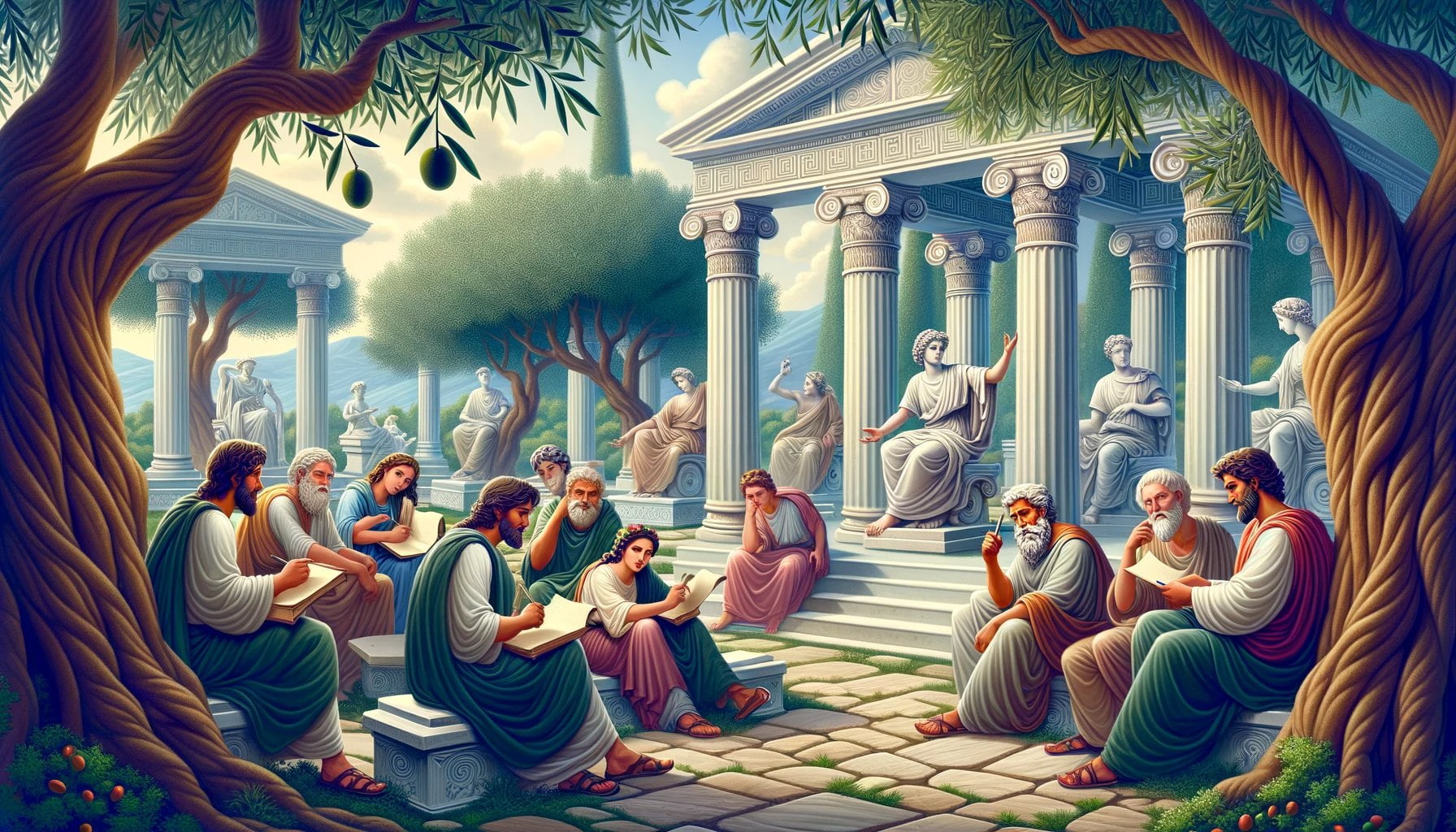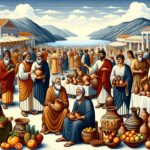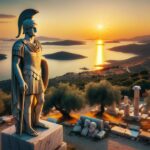Welcome to the captivating world of ancient Greek poets, where the timeless works of Homer and Sappho continue to mesmerize readers across the centuries. In this article, we embark on a journey of exploration, shining a light on the enigmatic figures who shaped the literary landscape of ancient Greece. Through a deep dive into their rich traditions, styles, and influential contributions, we will unveil the allure and significance of these legendary poets. So join us as we delve into the fascinating realms of Homer and Sappho, uncovering the secrets of their captivating world.
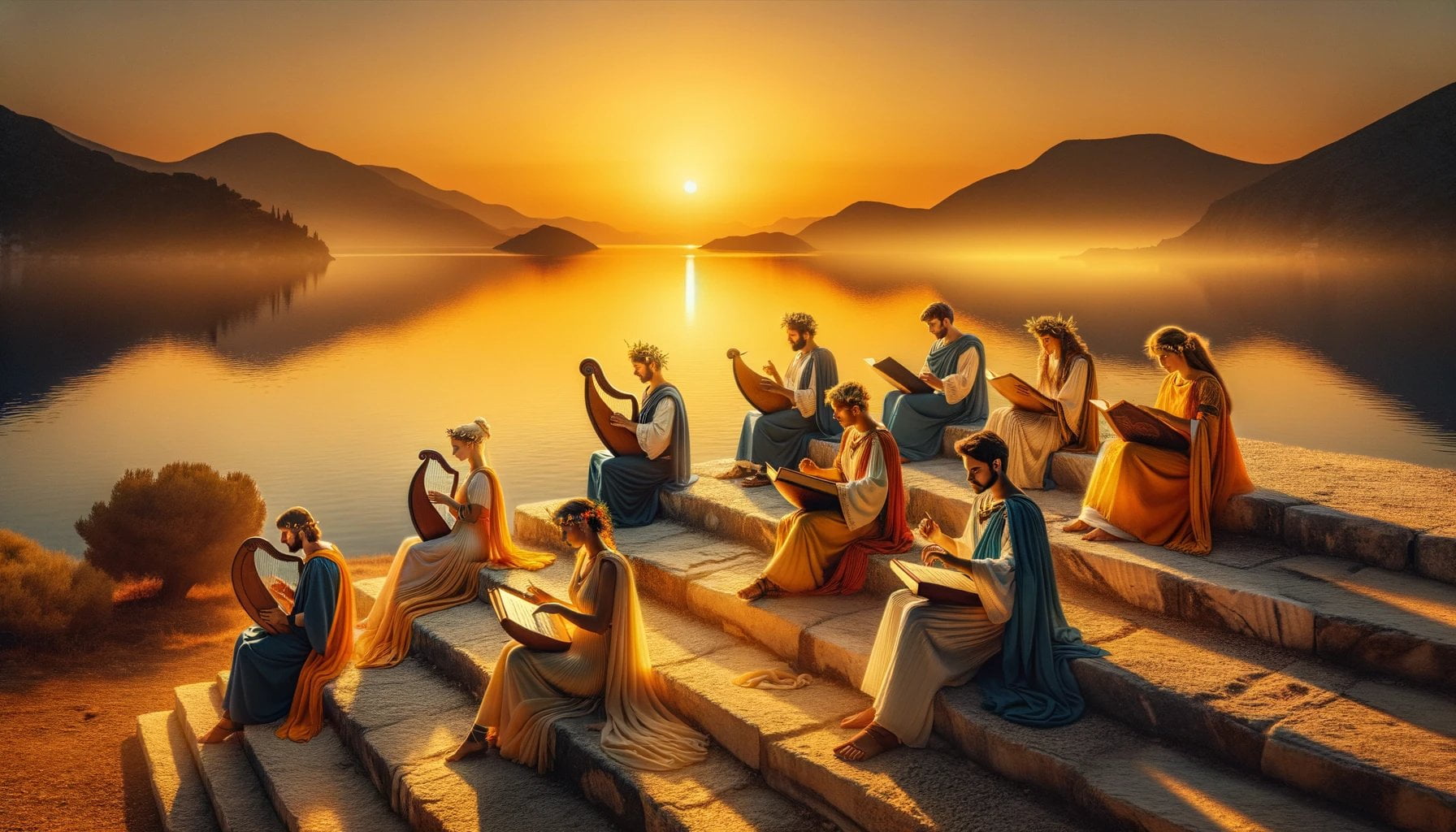
Key Takeaways:
- Greek poets, such as Homer, Hesiod, Aeschylus, Sappho, and Pindar, were influential writers of poetry in the Greek language.
- Homer is renowned for his epic poems, the Iliad and the Odyssey, while Hesiod wrote the Theogony and the Works and Days.
- Aeschylus is considered the father of Greek tragedy, and Sappho is known for her lyric poems on love and women.
- Pindar wrote odes to celebrate athletic victories, showcasing his talent as a poet.
- These ancient Greek poets have had a lasting impact on modern poetry and continue to inspire contemporary Greek poets such as Angelos Sikelianos, Kostas Varnalis, Christoforos Liontakis, Jenny Mastoraki, and Dimitris Varos.
Exploring the Enigmatic Poets of Ancient Greece: Unveiling the Captivating World of Homer and Sappho
The Legacy of Poets in Ancient Greece
In the captivating world of ancient Greece, poets held a revered position as masterful weavers of words and creators of timeless art. From the legendary Homer to the enigmatic Sappho, these poets left an indelible mark on the literary landscape and continue to inspire and captivate us even today.
Homer: The Epic Storyteller
Homer, often hailed as the father of Western literature, crafted two epic poems that have become the bedrock of Greek literature and storytelling: the Iliad and the Odyssey. These epic tales transport us to a world of myth, heroism, and adventure, where Achilles battles Hector and Odysseus embarks on his arduous journey home. Through vivid imagery, complex characters, and intricate narratives, Homer’s works not only entertain but also offer profound insights into the human condition.
Sappho: The Lyric Poetess
While little remains of her work today, Sappho is celebrated as the most famous lyric poetess of ancient Greece. Her poetry, primarily focused on themes of love and women, resonates with a sense of raw emotion and lyrical beauty. Sappho’s verses, often accompanied by the enchanting sounds of music and dance, offer a glimpse into the complexities of human relationships and the powerful sway of emotions. Though fragmented, her poems still ignite our imaginations and evoke a deep sense of longing and desire.
The Influence of Ancient Greek Poets
The impact of Greek poets extends far beyond ancient times, permeating the realms of modern literature, poetry, and even popular culture. Through their pioneering works, these poets established literary traditions, styles, and themes that continue to shape and inspire poets and writers today.
The Father of Greek Tragedy: Aeschylus
Aeschylus is often credited as the father of Greek tragedy. His plays, such as “Prometheus Bound” and “The Oresteia,” delve into profound explorations of human nature, fate, and justice. Aeschylus’s tragedies, characterized by their grandeur and intensity, established the foundation for the tragic genre and influenced countless playwrights throughout the ages.
Pindar: Odes to Athletic Triumphs
Celebrating the triumphs of athletes, Pindar was renowned for his odes, which eloquently praised the victors of ancient Greek games. His vivid imagery and rhythmic verses transported listeners to the thrilling world of athletics, infusing each victory with a sense of eternal glory. Pindar’s odes continue to inspire contemporary poets, serving as a testament to the enduring power of his craft.
Exploring the Enigmatic World of Greek Poets Today
The legacy of ancient Greek poets doesn’t end within the realm of the past. Their influence and spirit persist, finding resonance in the works of modern Greek poets who carry forward the torch of poetic artistry.
Angelos Sikelianos: Embracing Symbolism
Angelos Sikelianos breathed new life into Greek poetry by embracing symbolism and infusing his verses with a heightened sense of spirituality. His work, marked by profound introspection and a reverence for nature, resonates with readers who seek deeper connections with the world around them.
Kostas Varnalis: A Voice of Courage
As a prominent figure in modern Greek poetry, Kostas Varnalis emerged as a voice of courage and resilience during times of political turmoil. His poems, fueled by his unwavering spirit and unwavering commitment to justice, address the complexities of the human experience and inspire readers to stand up for their beliefs.
Christoforos Liontakis: Exploring Identity
Through his poetry, Christoforos Liontakis explores themes of identity, migration, and cultural heritage. His verses, often a blend of Greek and English, create a lyrical and thought-provoking tapestry of experiences, inviting readers to reflect on the evolving nature of our world.
Jenny Mastoraki: Elegance and Subtlety
Jenny Mastoraki weaves delicate threads of elegance and subtlety into her poetry. Her lyrical verses, infused with vivid imagery and emotional depth, evoke a sense of wonder and introspection, casting light on the intricate nuances of human existence.
Dimitris Varos: The Poet of Symbolic Metaphors
Dimitris Varos enchants readers with his mastery of symbolism and metaphors. His poetry immerses us in a realm where words take on new dimensions, inviting us to ponder the hidden truths that lie beneath the surface of everyday life.
In Conclusion
The poets of ancient Greece left an indelible mark on the literary world, shaping the course of poetry for centuries to come. From the epic grandeur of Homer to the emotional intensity of Sappho, their works continue to enthral and captivate audiences across the ages. Their enduring legacy reminds us of the power of poetic expression and the timeless beauty that lies within the words of the poets who came before us.
Explore the fascinating world of swords of ancient Greece, known for their intricate designs and historical significance. Discover more about these legendary weapons and their impact on ancient Greek warfare by clicking here.
Dive into the mystical realm of gods and heroes of ancient Greece, where myth and reality intertwine. Uncover the captivating tales of Zeus, Hercules, and other renowned figures by clicking here.
Delve into the rich history of colonies in ancient Greece and their significant contributions to culture and civilization. Learn about the thriving settlements beyond the Greek mainland by clicking here.
Embark on a journey through the intriguing world of animals in ancient Greece, where creatures such as the mighty lion and sacred owl were revered. Discover the symbolism and importance of these creatures by clicking here.
Unleash the thrill of ancient Greek sport by exploring the captivating world of boxing in ancient Greece. Step into the ring and uncover the origins and traditions of this renowned sport by clicking here.
Themes and Styles in Ancient Greek Poetry
Ancient Greek poetry encompasses a vast array of themes and styles, offering a rich tapestry of words that continues to captivate and inspire even to this day. From the epic poetry of Homer to the mesmerizing verses of Sappho, each poet brings a unique perspective and voice to the table. So, let’s embark on a journey through the enigmatic world of ancient Greek poets and explore the themes and styles that defined their works.
Homer: Unraveling the Epic
When we speak of ancient Greek poetry, it is impossible not to mention Homer, the legendary poet who crafted two epic masterpieces: the Iliad and the Odyssey. Homer’s works, attributed to the 8th century BCE, delve into the depths of the human condition, exploring themes such as honor, heroism, fate, and the complex emotions that drive individuals to extraordinary acts. Through his vivid storytelling and profound insights, Homer sheds light on timeless experiences that resonate with readers across centuries.
In the Iliad, the epic poem centered around the Trojan War, Homer delves into themes of honor, glory, and the power dynamics between mortals and gods. The Odyssey, on the other hand, explores the concept of nostos, or homecoming, as the hero Odysseus embarks on a perilous journey back to his homeland after the war. Both poems present a deep understanding of human nature and the struggles individuals face in their quest for identity and purpose.
Sappho: The Power of Love and Emotion
If Homer represents the epic side of ancient Greek poetry, then Sappho undoubtedly embodies the lyrical. Sappho, considered the most famous lyric poetess of ancient Greece, lived around the 6th century BCE on the island of Lesbos. Her poems, which often take the form of heartfelt lyrics and songs, delve into themes of love, desire, and the inner emotions of women.
Sappho’s verses evoke raw emotion and lyrical beauty, painting vivid scenes of love, longing, and heartbreak. She captures the intensity of passion and explores the complexities of human relationships with grace and sensitivity. Despite sparse surviving fragments of her work, Sappho’s influence on subsequent poets and her ability to convey the deepest of emotions make her an enduring figure in ancient Greek poetry.
Ancient Greek Poetry: A Tapestry of Styles
Beyond the works of Homer and Sappho, ancient Greek poetry encompasses a diverse range of styles and voices. Styles like elegy, pastoral, and didactic poetry emerged, each with its own unique characteristics and themes.
- Elegy: Elegy, often melancholic in nature, explores themes of love, loss, and mourning. Prominent elegiac poets like Callinus and Mimnermus gave voice to personal and collective grief, reflecting the fragile nature of human existence.
- Pastoral: The pastoral tradition, initiated by poets like Theocritus, focuses on the beauty of rural life, portraying idyllic scenes of shepherds, nature, and the simplicity of the countryside. Through its vivid imagery and serene themes, pastoral poetry explores the harmony between humans and the natural world.
- Didactic: Didactic poets like Hesiod and Empedocles seek to impart knowledge and moral teachings through their works. They delve into themes such as cosmology, farming techniques, and ethical principles, highlighting the practicality and informative nature of their poetry.
Ancient Greek poetry, in all its forms and styles, provided an avenue for self-expression, philosophical contemplation, and artistic exploration. It continues to be a testament to the enduring power of poetic language and its ability to evoke emotions, challenge perspectives, and transcend time.
Key Takeaways:
- Ancient Greek poetry includes both epic and lyric forms, with Homer’s Iliad and Odyssey representing the pinnacle of epic poetry.
- Sappho, the most famous lyric poetess of ancient Greece, delved into themes of love and emotion, capturing raw passion through her heartfelt verses.
- The themes and styles of ancient Greek poetry are diverse, ranging from elegy’s exploration of grief to pastoral’s celebration of nature and didactic’s imparting of knowledge.
- The works of ancient Greek poets continue to inspire and resonate with audiences, testifying to the timeless nature and enduring legacy of their art.
Citations:
The Influence of Greek Poets on Western Literature
The impact of Greek poets on Western literature is immeasurable. Their timeless works have shaped the literary traditions that we know today and continue to inspire writers across generations. Let’s delve into the captivating world of poets in ancient Greece, focusing on prominent figures like Homer and Sappho.
Homer: The Father of Western Literature
Homer, the greatest of ancient Greek epic poets, holds a revered position in the literary world. His epic poems, the Iliad and the Odyssey, are considered the starting point of Western canon. The influence of Homer’s works extends far beyond ancient Greece. In fact, his epics have significantly shaped the history of literature, not only in Greece but also in Rome and throughout the Western world.
Homer’s narratives are filled with vivid characters, heroic quests, and profound insights into the human condition. They explore timeless themes such as honor, heroism, fate, and the complexities of human nature. These themes resonated with ancient Greek culture and later influenced Roman literature as well. As a result, Homer’s works became foundational to Western literature, serving as a touchstone for countless authors.
Sappho: The Lyric Poetess
Another significant figure in Greek poetry is Sappho, the most famous lyric poetess of ancient Greece. Her works focused on themes of love, desire, and the inner emotions of women. Sappho’s poetry evokes raw emotion and lyrical beauty, captivating her audience with its elegance and subtlety.
Although much of Sappho’s work has been lost over time, fragments of her poetry have survived, giving us glimpses into her talent and influence. Sappho’s unique perspective and poetic style have inspired generations of poets and continue to be a source of inspiration for contemporary writers.
The Far-Reaching Influence of Greek Poets
The impact of Greek poets is not limited to Homer and Sappho alone. The entire spectrum of Greek literature, including its poetry, has had a lasting influence on Western literature. Roman authors, deeply influenced by Greek culture, adopted styles and motifs from Greek literature, creating a bridge between the two civilizations. European writers and critics later drew inspiration from these works, further cementing their place in the Western literary tradition.
Greek literature, spanning from the 1st millennium BC to the present day, has nurtured a continuous tradition of poetic expression. Writers from various regions, including Greece, Asia Minor, Aegean Islands, and Magna Graecia (Sicily and southern Italy), have contributed to this vibrant literary heritage.
The influence of Greek poets becomes particularly evident in later Greek literature, such as the Greek novels. These writings carry forward the tradition of storytelling and explore various genres, including romance, adventure, and philosophical reflections.
Greek Poetry and Society
Ancient Greek poetry was intricately linked to social and political life. It reflected the values, behavior, and societal norms of individuals within ancient Greek society. The poetry of that time captures the essence of Greek culture, providing invaluable insights into its customs, rituals, and beliefs.
Classical Greek culture, including its literature, went beyond poetry and made profound contributions to philosophy, mathematics, astronomy, medicine, and drama. These contributions continue to shape modern culture, influencing our understanding of the world and our place within it.
Key Takeaways:
- Homer, the greatest of ancient Greek epic poets, crafted the Iliad and the Odyssey, which are considered the beginning of the Western canon of literature.
- Homer’s works have had a significant influence on the history of literature, shaping Greek culture and inspiring Roman and Western writers.
- Sappho, the renowned lyric poetess, explored themes of love and women’s emotions in her poetry, leaving a lasting impact on the poetic tradition.
- Greek literature, including poetry, has a continuous history from ancient times to the present day, with writers hailing from Greece, Asia Minor, Aegean Islands, and Magna Graecia.
- The influence of Greek poets extends beyond literature and encompasses aspects of society, philosophy, and other disciplines.
- Greek literature’s enduring impact on Western literature can be seen in the adoption of styles and motifs by Roman and European writers, contributing to the development of the Western literary tradition.
Sources:
– Britannica
Revival and Preservation of Ancient Greek Poetry
The rich traditions and influential figures of ancient Greek poetry continue to captivate and inspire audiences to this day. In this article, we will delve into the enigmatic world of two prominent Greek poets, Homer and Sappho, and explore the significance of their works in the context of the revival and preservation of ancient Greek poetry.
The Enigmatic Poets: Homer and Sappho
Homer, considered the father of Western literature, crafted two epic poems that have stood the test of time: the Iliad and the Odyssey. These masterpieces offer profound insights into the human condition, exploring themes of honor, heroism, fate, and the complex nature of humanity itself. Bold and imaginative, Homer’s poetic genius resonates through the ages, providing a timeless window into ancient Greek culture.
Sappho, on the other hand, is renowned as the most famous lyric poetess of ancient Greece. Her poems focused on themes of love, desire, and the raw emotions of women, evoking a sense of lyrical beauty that continues to inspire contemporary writers. Although much of her work has been lost over the centuries, fragments of her poetry remain, serving as a testament to her unparalleled talent.
The Importance of Reviving and Preserving Ancient Greek Poetry
Revival and preservation efforts are crucial in ensuring that the rich literary heritage of ancient Greece is not forgotten. By exploring the works of poets like Homer and Sappho, we gain a deeper understanding of the values, beliefs, and societal norms of ancient Greek culture. These poets acted as masterful weavers of words, creating timeless art that reflects the essence of their era.
Moreover, the revival and preservation of ancient Greek poetry allow us to trace the roots of Western literature and appreciate its profound influence. Homer, with his epic poems, laid the foundation for a literary tradition that shaped the course of history. Sappho, with her heartfelt verses, paved the way for lyrical expression and the exploration of personal emotions.
Unveiling the Captivating World of Greek Poets
To truly appreciate and revive the world of ancient Greek poets, it is essential to understand the various genres within Greek literature. Greek poetry encompasses a wide range of styles, including epic, lyric, and drama. Each genre offers a unique perspective on the human experience, provoking thought and engaging emotions in the reader.
Applying the principles of oral poetry theory to ancient Greek poetry further enhances our understanding of its cultural significance. In the archaic era, poetry was predominantly an oral tradition, passed down through generations. The study of oral poetry theory allows us to uncover the intricacies of ancient Greek poetic composition and decipher the hidden layers of meaning within their works.
Key Takeaways:
- Homer and Sappho are two influential ancient Greek poets who have left an indelible mark on Western literature.
- Reviving and preserving ancient Greek poetry is crucial to understanding the cultural heritage and influence of these poets.
- Homer’s epic poems, the Iliad and the Odyssey, explore themes of honor, heroism, fate, and the human condition.
- Sappho’s lyric poetry delves into themes of love, desire, and the emotions of women, creating captivating and evocative verses.
- Greek poetry encompasses various genres, including epic, lyric, and drama, each offering a unique perspective on human experience.
- Oral poetry theory helps unravel the hidden layers of meaning within ancient Greek poetry, providing deeper insights into their composition.
Sources:
1. Cambridge University Press – Wandering Poets in Ancient Greek Culture
2. Ancient Greek literature – Wikipedia
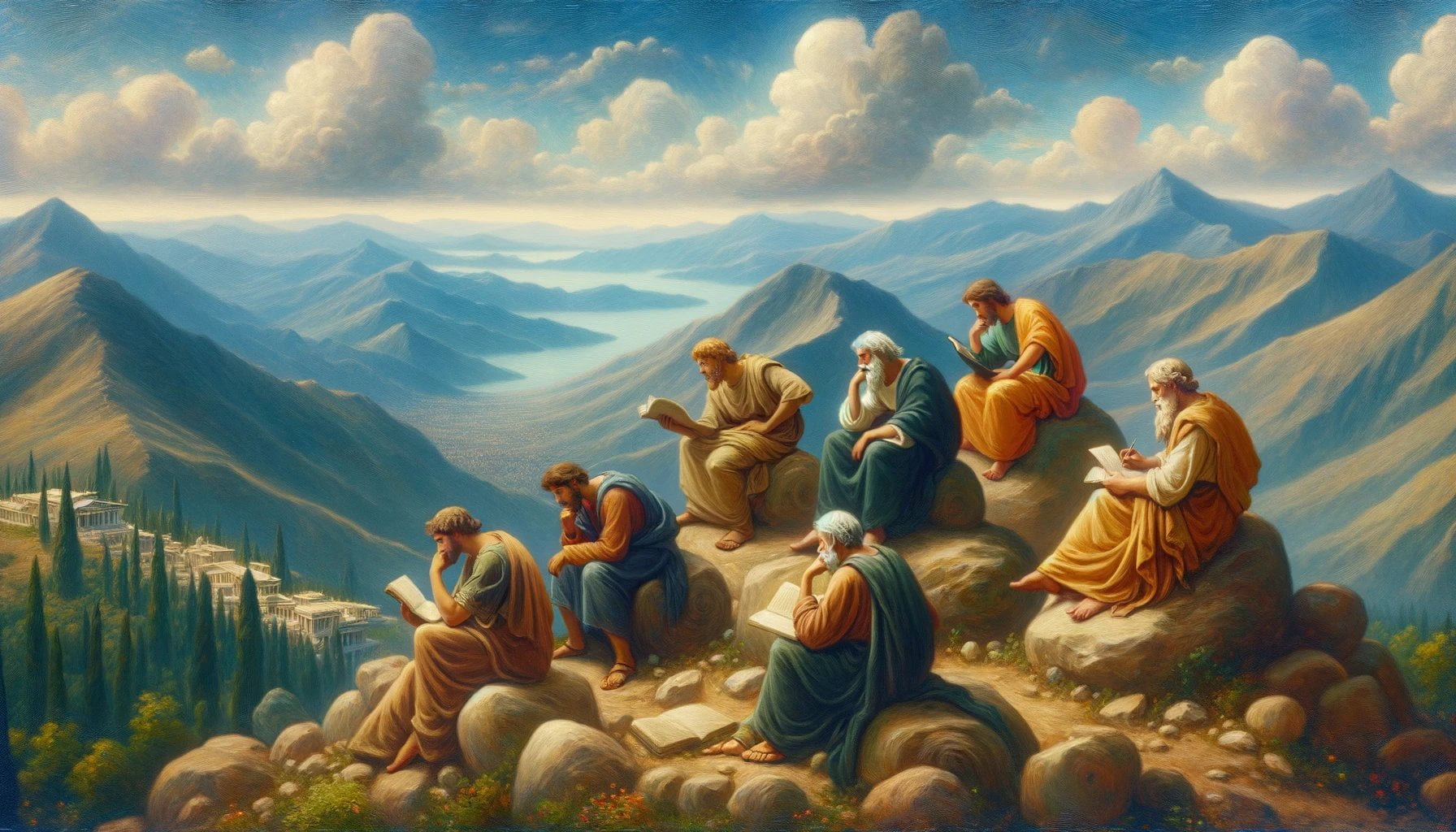
FAQ
Q1: Who are some famous ancient Greek poets?
A1: Some famous ancient Greek poets include Homer, Hesiod, Aeschylus, Sappho, and Pindar.
Q2: What are the most famous epic poems written by Homer?
A2: Homer is known for writing the epic poems the Iliad and the Odyssey.
Q3: What is lyric poetry in ancient Greek literature?
A3: Lyric poetry is a form of Greek poetry that includes works by poets such as Sappho and Pindar.
Q4: What is the impact of ancient Greek literature on Western culture?
A4: Ancient Greek literature, including the works of Homer, has had a lasting impact on Western literature, with Roman authors adopting styles and motifs from Greek literature, and later European writers and critics drawing inspiration from these works.
Q5: What is the significance of Greek literature in the development of Western literary tradition?
A5: Greek literature, deeply rooted in Greek mythology, epics, and tragedies, has played a foundational role in shaping the Western literary tradition.
